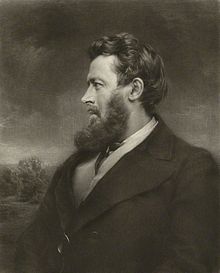 Glenn Gould plays Beethoven’s E Major Piano Sonata, Op. 109, on the CBC in 1964:
Glenn Gould plays Beethoven’s E Major Piano Sonata, Op. 109, on the CBC in 1964:
(This is the latest in a series of arts-related videos that appear in this space each Monday, Wednesday, and Friday)
Terry Teachout on the arts in New York City
 “The gentlemanliness of our statesmen is no secondary excellence. It was said by Burke of a great nobleman of the last century that ‘His virtues were his means’; that he accomplished by a gentle and high-minded honour what it would have been impossible to effect by coarse ability or impetuous disputation. If this great quality should die out from our political life, if it should be greatly diminished and permitted to sink gradually into decay, our political life will have lost a principal redeeming feature—our freedom will have lost one of its best securities—our statement will have lost the surest and best means of managing men.”
“The gentlemanliness of our statesmen is no secondary excellence. It was said by Burke of a great nobleman of the last century that ‘His virtues were his means’; that he accomplished by a gentle and high-minded honour what it would have been impossible to effect by coarse ability or impetuous disputation. If this great quality should die out from our political life, if it should be greatly diminished and permitted to sink gradually into decay, our political life will have lost a principal redeeming feature—our freedom will have lost one of its best securities—our statement will have lost the surest and best means of managing men.”
Walter Bagehot, “The Manners of Statesmen” (originally published in 1862 in The Economist)
 A quick reminder: John Douglas Thompson and I are coming to the Drama Book Shop next Wednesday. We’ll be discussing, taking questions about, and signing copies of the published version of Satchmo at the Waldorf, my one-man-three-character play about the life of Louis Armstrong, in which John has starred to spectacular effect off Broadway and from coast to coast.
A quick reminder: John Douglas Thompson and I are coming to the Drama Book Shop next Wednesday. We’ll be discussing, taking questions about, and signing copies of the published version of Satchmo at the Waldorf, my one-man-three-character play about the life of Louis Armstrong, in which John has starred to spectacular effect off Broadway and from coast to coast.
The Drama Book Shop is at 250 W. 40th St. in New York. The event starts at five p.m. sharp. For more information, go here.
In today’s Wall Street Journal I review a Chicago revival of Leonard Bernstein’s Wonderful Town and the Broadway premiere of a new stage version of Irving Berlin’s Holiday Inn. Here’s an excerpt.
* * *
Why isn’t “Wonderful Town” more popular? It’s a fizzy, festive champagne cocktail of a musical about a pair of small-town girls who come to New York to chase their dreams. The music is by Leonard Bernstein, the lyrics by Betty Comden and Adolph Green, a triple-barreled guarantee of quality. The original 1953 Broadway production ran for 559 performances, and the 2003 revival, in which Donna Murphy took over the starring role created a half-century earlier by Rosalind Russell, was similarly successful. So why doesn’t it get done as often as “West Side Story”? What’s not to like? Judging by Mary Zimmerman’s glorious new Goodman Theatre production, the only possible answer is: not a damn thing. Flawlessly cast, wittily staged and delightfully designed, this “Wonderful Town” is good enough to hop a plane to see—and once it closes in Chicago, it deserves a Broadway run of its own.
 “Wonderful Town” is all about Ruth and Eileen Sherwood (Bri Sudia and Lauren Molina), two not-a-bit-alike sisters from Ohio who rent a grimy basement apartment in Greenwich Village and discover the magic of Manhattan. Ruth is a sharp-witted fledgling writer whose brains scare off men: “Just throw your knowledge in his face,/He’ll never try for second base.” Not so the unselfconsciously dizzy Eileen, whose charms are so potent that no one gives Ruth a second glance. That’s the conflict, such as it is, and just because you know from the start that they’ll both live happily ever after doesn’t mean you won’t love finding out how it comes to pass.
“Wonderful Town” is all about Ruth and Eileen Sherwood (Bri Sudia and Lauren Molina), two not-a-bit-alike sisters from Ohio who rent a grimy basement apartment in Greenwich Village and discover the magic of Manhattan. Ruth is a sharp-witted fledgling writer whose brains scare off men: “Just throw your knowledge in his face,/He’ll never try for second base.” Not so the unselfconsciously dizzy Eileen, whose charms are so potent that no one gives Ruth a second glance. That’s the conflict, such as it is, and just because you know from the start that they’ll both live happily ever after doesn’t mean you won’t love finding out how it comes to pass.
Ms. Zimmerman has directed “Wonderful Town” in the manner of her pared-down 2015 Oregon Shakespeare Festival revival of “Guys and Dolls.” While the funny parts are really funny, she’s fully alive to the hopeful sweetness that keeps “Wonderful Town” perpetually fresh, and her stars are on the same wavelength….
“Holiday Inn, the New Irving Berlin Musical” (that’s the official title, which tells you all you need to know) is less a show than a cash machine, a cynical repurposing of the beloved 1942 Bing Crosby-Fred Astaire film that exists solely to make as much money as possible for the Roundabout Theatre Company. It’s slick, synthetic and soulless, a musical full of robotic jokes and devoid of genuine romance…
* * *
To read my review of Wonderful Town, go here.
To read my review of Holiday Inn, go here.
 A rare kinescope of a complete TV performance of Wonderful Town, originally broadcast live by CBS on November 30, 1958. Rosalind Russell stars as Ruth Sherwood, the role she created in the 1953 Broadway production. The cast also includes Jackie McKeever as Eileen Sherwood and Sydney Chaplin as Bob Baker. The music is by Leonard Bernstein and the lyrics are by Betty Comden and Adolph Green. The production was directed by Mel Ferber and Herbert Ross and choreographed by Ralph Beaumont:
A rare kinescope of a complete TV performance of Wonderful Town, originally broadcast live by CBS on November 30, 1958. Rosalind Russell stars as Ruth Sherwood, the role she created in the 1953 Broadway production. The cast also includes Jackie McKeever as Eileen Sherwood and Sydney Chaplin as Bob Baker. The music is by Leonard Bernstein and the lyrics are by Betty Comden and Adolph Green. The production was directed by Mel Ferber and Herbert Ross and choreographed by Ralph Beaumont:
(This is the latest in a series of arts-related videos that appear in this space each Monday, Wednesday, and Friday)
In today’s Wall Street Journal “Sightings” column I speak out in support of shorter theatrical performances—and cutting the classics. Here’s an excerpt.
* * *
The Metropolitan Opera will be broadcasting its much-discussed new production of Richard Wagner’s “Tristan und Isolde” in movie theaters on Oct. 8. Not being a Wagner buff, I won’t be there, but even if I did care to see it, I’d likely find it daunting that the official running time of the telecast is five hours and 15 minutes. Even with popcorn, that’s a long, long slog. Most popular operas, of course, are considerably shorter: The Met’s production of Puccini’s “La Bohème” runs for a hair under three hours, counting two half-hour intermissions. But given the fact that today’s audiences have more claims on their time and attention than ever before, it’s hard not to suspect that grand opera—like the performing arts in general—is swimming upstream against a rising tide of impatience….
 My own taste for terseness has been shaped by the fact that I attend some 100 plays each year in my capacity as The Wall Street Journal’s drama critic, which often leads me to utter what I call the Drama Critic’s Prayer: “Dear God, if it can’t be good, let it be short.” You don’t have to be a critic to feel that way. Terence Rattigan, England’s master of the well-made play, predicted back in the ‘50s that younger playgoers conditioned by movies and TV would eventually start to chafe at the three-hour-two-intermission running time that was then the theatrical norm. According to Michael Darlow, his biographer, Rattigan “forecast the development of generally shorter plays…with running times of 60 to 80 minutes.” Sure enough, it’s now common for straight plays to run for an hour and a half with no intermission….
My own taste for terseness has been shaped by the fact that I attend some 100 plays each year in my capacity as The Wall Street Journal’s drama critic, which often leads me to utter what I call the Drama Critic’s Prayer: “Dear God, if it can’t be good, let it be short.” You don’t have to be a critic to feel that way. Terence Rattigan, England’s master of the well-made play, predicted back in the ‘50s that younger playgoers conditioned by movies and TV would eventually start to chafe at the three-hour-two-intermission running time that was then the theatrical norm. According to Michael Darlow, his biographer, Rattigan “forecast the development of generally shorter plays…with running times of 60 to 80 minutes.” Sure enough, it’s now common for straight plays to run for an hour and a half with no intermission….
It’s worth keeping in mind, incidentally, that Shakespeare’s longer plays are normally staged in abridged versions. To see an uncut four-and-a-half-hour “Hamlet” is an extreme rarity. Now that the plays of such notoriously long-winded writers as Eugene O’Neill and George Bernard Shaw are going out of copyright, it’s becoming increasingly common for them to also be presented in shortened versions, a development of which I wholeheartedly approve. I’ve seen Shaw’s “Heartbreak House” and O’Neill’s “Long Day’s Journey Into Night” done both ways, and I think they work far better with cuts.
So why not abridge longer operas as well? In fact, it used to be customary for opera houses to do so, and the practice continues to this day in many houses….
* * *
Read the whole thing here.
| M | T | W | T | F | S | S |
|---|---|---|---|---|---|---|
| 1 | 2 | |||||
| 3 | 4 | 5 | 6 | 7 | 8 | 9 |
| 10 | 11 | 12 | 13 | 14 | 15 | 16 |
| 17 | 18 | 19 | 20 | 21 | 22 | 23 |
| 24 | 25 | 26 | 27 | 28 | 29 | 30 |
| 31 | ||||||
An ArtsJournal Blog